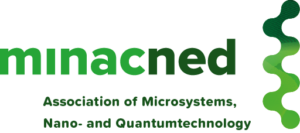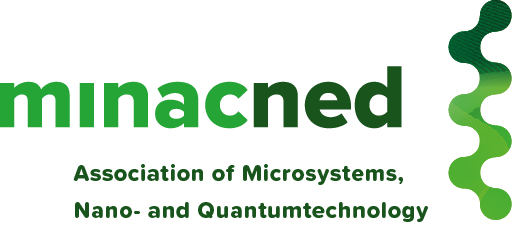On Thursday 14 April, the Dutch government announced the projects approved for the National Growth Fund in 2022. In addition, NanoLabNL has been approved for the second tranche of the QuantumDeltaNL Dutch Growth Fund for maintaining and developing the Dutch national infrastructure in nanotechnology.
Of the projects awarded funding, NXTGEN HIGHTECH and PhotonDelta in particular make use of the many advantages offered by nanotechnology. NXTGEN HIGHTECH received €450 million and PhotonDelta €471 million. In addition to QuantumDeltaNL, these projects will benefit from the existing cleanroom infrastructure of NanoLabNL.
NXTGEN HIGH TECH
The NXTGEN HIGHTECH programme focuses on the development of a new generation of high-tech equipment. This programme will make an important contribution to the competitiveness, earning capacity and employment of the Netherlands. It will help address some of the larger societal challenges ahead (Health, Energy, Sustainability, etc.).
PhotonDelta
PhotonDelta is an international ecosystem of organisations in integrated photonics. PhotonDelta aims to develop photonic technology to address societal challenges such as sustainability, create a new European industry and open the door to a huge range of new applications, including quantum computing. Capital from the Dutch National Growth Fund and other organisations will be used to set up start-ups, scale up production, create new applications for photonic chips and develop infrastructure and talent.
Additional funds to maintain ecosystem
On the same day, additional funds in QuantumDeltaNL will be available for Nano4Society and MinacNed to deploy nanotechnology within the ecosystem to develop solutions for major societal transitions and create societal impact. The activities will contribute to MinacNed’s goal of strengthening the economy based on microsystems and nanotechnology.
Professor Lieven Vandersypen (Photography: Studio Oostrum)
NWO has announced that our Director Research Lieven Vandersypen is awarded the NWO Spinoza Prize. The Spinoza Prize is the highest award in Dutch Science. Each laureate receives 2.5 million euros, which they can spend on scientific research and activities related to knowledge utilisation.
Lieven Vandersypen (1972) is Antoni van Leeuwenhoek Professor of Quantum Nanoscience at TU Delft and Director Research at QuTech. Vandersypen enjoys a worldwide reputation for his pioneering work in quantum computing, the branch of science devoted to developing a computer based on the mysterious phenomena of quantum mechanics.
Quantum computers can resolve mathematical problems that are too complex for even the best supercomputers, such as calculating the properties of molecules and materials. Accordingly, they could help to solve major societal challenges in domains such as energy, security and health. Lieven Vandersypen aims to find uses for nature’s most fundamental properties and has been pursuing that goal by conducting cutting-edge experiments in the field of quantum computing for more than twenty years.
During his doctoral research, Vandersypen already realized a world-wide first: he used the so-called spins of atomic nuclei in molecules as quantum bits, or qubits, the building blocks of a quantum computer. Using seven qubits, he was able to break down the number 15 into the factors 3 and 5, thus demonstrating that making calculations with qubits is not only possible in theory, but also in practice.
After obtaining his PhD, Vandersypen switched his attention from nuclear spins in molecules to the spins of electrons in quantum dots, minuscule objects made from semiconductor materials that are governed by the laws of quantum mechanics. They resemble transistors in many respects and can therefore be used to integrate large numbers of qubits in a chip. He was the first to manipulate individual electron spins, with both magnetic and electric fields. He was later also the first to implement quantum algorithms on two of those electron spins and to show the quantum interaction between an electron spin and a microwave photon. He also demonstrated that the same quantum dots could be used to study exotic forms of magnetism.
Vandersypen is not only an outstanding scientist, but also a visionary who advances his discipline through collaboration with partners in science and other domains. For example, he was one of the founders of the research institute QuTech, a collaboration between TU Delft and TNO, and persuaded the American corporation Intel to enter into a long-term partnership with QuTech. Vandersypen is also one of the architects of the demonstration project Quantum Inspire, the first European online quantum computer with which users can perform calculations from home with two different types of qubits.
Vandersypen is a highly decorated scientist who has received a number of prestigious grants for his research projects, including a Vidi and a Vici grant and ERC Starting Investigator, Synergy and Advanced grants. He has considerable experience in leading large groups of researchers, engineers, technicians and support staff and is attracts outstanding international students, PhD candidates and postdocs. Ten former group members have already formed their own research groups at prestigious institutions around the world.
The Spinoza committee is convinced that with his qualities, vision and drive and his excellent network of academic and private partners, Lieven Vandersypen will be able to make the further major scientific and technological breakthroughs that are required to realise the full potential of the quantum computer in the coming years.
Source: NWO Spinoza
Also read this article from QuTech, Vandersypen is one of the founders of the research institute QuTech, a collaboration between TU Delft and TNO.
QuiX Quantum, the worldwide market leader in quantum photonic processors, has delivered a 12-mode quantum photonic processor to Germany, for a collaboration with researchers from Paderborn University. This photonic processor is the most powerful in the world.
Quantum photonic processors are the central component of photonic quantum computers, holding great promises in performing certain computations faster than current supercomputers. Machine learning, chemistry and finance are believed to be revolutionized by such quantum technology.
QuiX Quantum lead engineer Caterina Taballione says: “This collaboration confirms the continuing interest in our products from the major players in the international quantum photonics landscape. Paderborn University is at the forefront of integrated optics, and we look forward to the results of this collaboration.”
The announcement comes on the heels of the announcement of a sale to Qontrol, a British quantum technologies startup, and a sale to Quandela, the leading French quantum technologies firm. Prof Christine Silberhorn, head of the Integrated Quantum Optics group and spokeswoman of the Institute for Photonic Quantum Systems (PhoQS), says: “We have chosen QuiX because of the high quality, turnkey linear optical circuit as used for demonstrating quantum advantage in boson sampling experiments, that only QuiX can deliver.”
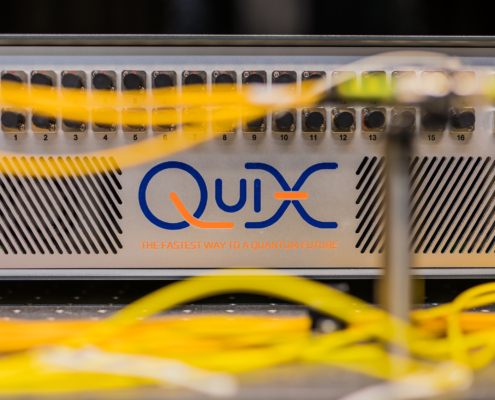
QUIX | Forward.one – Vrijdag 22 januari 2021 | © Verkijk
Germany has recently published its ‘Roadmap Quantencomputing’, which sketches the required steps on the way towards a working quantum computer. As a result, the German government announced a 2 billion Euro funding initiative for the development of quantum technologies in general and quantum computers in particular.
The success that QuiX Quantum’ products are having highlights the dominant position of photonics in the quantum computing landscape in the Netherlands, being the only able to provide turn-key quantum solutions.
From left to right: Ton van ‘t Noordende (Investor in Residence, Quantum Delta NL), Matthijs Rijlaarsdam (QuantWare). Alessandro Bruno (QuantWare), Freeke Heijman (director Quantum Delta NL). Photos by Rebekka Mell, in the DiCarlo Lab (QuTech).
Quantum Delta NL announces the launch of a two million euro micro fund called ‘LightSpeed Fund 1’. The fund will focus on supporting early stage quantum startups. Delft-based startup and participant in the LightSpeed program, QuantWare, is the first startup to receive funding.
The fund is part of Quantum Delta NL’s strategic roadmap to increase the number of successful quantum startups in the Netherlands. Currently, there are seven quantum startups in the Netherlands, and Quantum Delta NL is on a mission to see this number increase to 100 by 2027. These companies are considered to become of great value to the Dutch economy.
In pursuit of this goal, last month Quantum Delta NL launched its new initiative, LightSpeed. Lightspeed is a program connecting Dutch quantum startups in all phases, where the startups receive tailored assistance and guidance to scale up their businesses and optimize their attractiveness to top-tier investors. Specifically for the initiative, efforts were made to approach and bring in European and American funds with a wealth of experience to support startups. Lightspeed aims to create optimal conditions to build sustainable and future-proof startups.
Fund
Following today’s launch of the micro fund, managed by LightSpeed, Quantum Delta NL awards pre-seed tickets amounting to 50,000 euros each to early-stage startups in the field of quantum technology. LightSpeed adapted a modern instrument that is straightforward, founder-friendly and fills the gap in the earliest stage for quantum technology startups: the SAFE note (Simple Agreement for Future Equity). This approach gives startups the maximum flexibility needed in the earliest stages, particularly in the quantum technology space as development timelines and road to profitability extend far beyond that of classic startups. The investment does not have to be repaid, as with a traditional convertible loan or note, if a startup fails to advance.
Quantum Delta NL’s Investor in Residence Ton van ‘t Noordende clarifies: “The Netherlands has a top position globally if we look at the number of quantum technology startups. This is unfortunately not the case on the capital side as there is virtually no professional venture capital available for early stage quantum startups. Our goal with Lightspeed is to enable founders to get the best possible start of their company.”
Quantum Delta NL has currently allocated two million euros for the pre-seed tickets and intends to award 5 to 15 tickets in fiscal year 2021/2022 and 35 to 40 tickets over the total period. The budget will be increased once Phase 1 of the National Growth Fund Program is underway.
QuantWare
QuantWare, a spinout of QuTech and part of the Quantum Delft ecosystem which develops high-performance quantum processors, is the first startup to tap into the microfund as part of a larger investment round. This makes it the second success story in the LightSpeed program. LightSpeed has also supported and guided the Delft-based startup QphoX in their fundraising round, which raised two million euros in funding with the help of the LightSpeed team to bring its Quantum Modem to the market.
Ambition
Startups and building a business ecosystem are key pillars of the Quantum Delta NL-program that heard it will receive 615 million euros from the National Growth Fund in April. Among other things, the program fuels the further development of the first European quantum computer and a quantum internet, openly accessible to end users in business and social sectors, including education. McKinsey calculated that in the medium term, the program will raise the gross domestic product by 5 to 7 billion euros and create 30,000 high-quality jobs in the Netherlands.
Freeke Heijman, director Quantum Delta NL: “We want the knowledge from the scientific labs to lead to new businesses in the Netherlands and Europe. With LightSpeed and this fund, promising initiatives will get an unprecedented acceleration to scale up their idea to a startup or scale-up.”
Ton van ‘t Noordende, Investor in Residence Quantum Delta NL: “We see the micro fund as a logical extension of LightSpeed. Promising and early stage initiatives only need a small injection of capital to hit the ground running. This is proven by QuantWare which, relying on our investment and on Lightspeed’s guidance, has raised immediate market capital even before launching their company.”
Alessandro Bruno, Director of Engineering at QuantWare: “The support from this fund and LightSpeed will allow us to bring our quantum processors to market. In doing so, we are making quantum accessible to more parties. In this way, we can make a crucial contribution that allows the Dutch quantum ecosystem to build on its current lead.”
22 July 2021 – QuiX Quantum reports the realization of the largest Universal Quantum Photonic Processor in a scientific paper published today.
In a scientific paper published in Materials for Quantum Technology today, QuiX Quantum demonstrates the world’s largest universal quantum photonic processor, which shows excellent performance for quantum information processing and computing applications. With this work, QuiX Quantum demonstrates the first commercially available, turn-key processor for photonic quantum computing.
The results reported in the paper highlight the unique expertise of QuiX Quantum in combining photonic and quantum systems engineering, and the market-readiness of the technological solution. QuiX’ expertise and technology can provide solutions for the entire spectrum of quantum applications.
Photonic processors are a crucial component for photonic quantum computing, which promise great impact in the fields of machine learning, quantum chemistry and cryptography. The universal quantum photonic processor reported in the paper is embedded in a plug-and-play control system operated by QuiX’ dedicated control software.
QuiX Quantum’s CTO Jelmer Renema says: “With this work we have demonstrated not only a leading position in the commercial landscape of photonics quantum computing, but also in the technological development of quantum photonic engineering.”
QuiX Quantum is a company based in Enschede, the Netherlands, that realizes quantum technology solutions based on the proprietary silicon nitride waveguide technology TriPleX that enables the realization of large-scale integrated photonic circuits with low loss. The maturity of the waveguide technology allows for achieving full reconfigurability and all-to-all connectivity of the elements of the photonic processor that can be thus defined as universal.
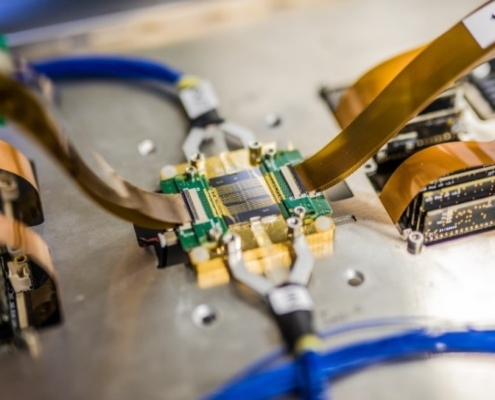
Photo credit: Daniël Verkijk
Source: Quix News
The program for the international MicroNanoConference 2021 is well underway with speakers from academia and industry. On December 2 and 3, 2021 we look forward to meeting you on location in Utrecht, at the Jaarbeurs.
This year’s main theme is: From science to market – scale-up in nanotech
With these sub sessions, that you will find in the program:
- Nano4Health & Life Sciences
- Nano4Agri& Food
- Scale-up in nanotechnology
- Miniturization in nanotechnology
- Manufacturing in nanotechnology
- Life after PhD
Tickets are now available at an early bird rate and it is now also possible to submit an abstract for either a poster or oral presentation at the conference. Read more about the program, tickets and abstract submission on the iMNC21 website.
For companies who would like to both support the micro- nano community and also showcase their company to this community, sponsor and exhibitor opportunities will be published soon.
Read more: micronanoconference.org
On Monday 14 June the Dutch State Secretary for Economic Affairs and Climate Policy Mona Keijzer, visited the Quantum Delta NL Center for Quantum Materials and Technology in Eindhoven. During this working visit she was shown some of the cutting edge research projects and laboratories that stand to benefit directly from the € 615 million award from the National Growth Fund.
Alongside the discussions on Quantum, there was some time to focus on the unique open infrastructure that puts The Netherlands at the forefront of innovation in quantum- and nanotechnology. Out of the € 615 million NGF award, € 150 million is reserved for maintaining and developing this infrastructure. Prof. Guus Rijnders, chairman of NanoLabNL and member of the supervisory board of Quantum Delta, explained from first-hand experience why and how NanoLabNL develops and maintains a thriving technological ecosystem.
Guus Rijnders also offered Mrs. Keijzer the first edition of the newly published NanoLabNL Manifesto; a broad testimony that focuses on the importance of open access high-tech cleanrooms, facilities and equipment, important for education, research, technology development and transfer. NanoLabNL is crucial in maintaining our leading position in many current and future science, as well as research & innovation, that rely on micro and nano fabrication. He expressed his appreciation for the financial support and urged the State Secretary to keep the subject of a healthy and viable scientific climate high on the political agenda.
The construction of the Dutch “national headquarters” for quantum technology has begun. Located at the Delft University of Technology (TU Delft) campus, the House of Quantum will put scientists, students, entrepreneurs and financiers in close quarters, in hopes of creating a smooth ecosystem that will accelerate the technology’s development and adoption. It will also feature the Living Lab Quantum and Society: an environment where stakeholders come together to develop ethical, legal and social standards surrounding quantum technology.
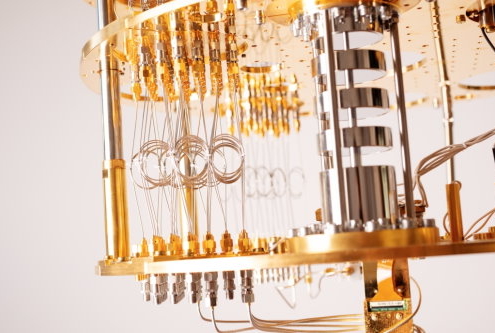
Credit: Marieke de Lorijn
“With the House of Quantum, we’re taking the next important step in building the best ecosystem for quantum technology in Europe. It’s great to soon have a place where our program comes together physically. This really will be our business card to the world,” says Freeke Heijman, director of Quantum Delta NL, a public-private partnership tasked with bolstering Dutch quantum activities. The consortium was recently awarded 615 million euros in funding from the National Growth Fund.
Source news: Bits&Chips
Quantum Delta NL launches LightSpeed, a program that can connect Dutch quantum startups with 13.6 billion in investment capital, managed by European and U.S. funds. The startups will be guided by Quantum Delta NL’s Investor in Residence Ton van ‘t Noordende (founder PHX, founder and former deep tech investor | 01Ventures).
With LightSpeed, quantum startups will receive personalized tailored assistance to scale their businesses and optimize their attractiveness to investors. Specifically for the project, contact has been made with European and American funds, totalling up to 13.6 billion in investment capital. By helping these startups with everything related to scaling their business and fundraising, rapid scenario planning, cap table assessment and finding investors, Quantum Delta NL wants to increase the number of successful quantum startups founded in the Netherlands. Currently, the country has 7 official quantum startups. This number should grow to 100 by 2028. These companies are considered to become of great value to the Dutch economy.
LightSpeed is built for Dutch quantum startups in all phases, ranging from pre-foundation to series B and everything in between, with a focus on market validation and investment. The LightSpeed-team has led the effort and guided Delft-based quantum modem startup QphoX to successfully raise 2 million euros in funding, right out of stealth. The funding round was led by a European syndicate of top deeptech investors, Quantonation, Speedinvest and High-Tech Gründerfonds, with participation from TU Delft University.
Ambition
Startups and building a business ecosystem are key pillars of the Quantum Delta NL-programme that received 615 million euros from the National Growth Fund last month. Among other things, the programme fuels the further development of the first European quantum computer and a quantum internet, openly accessible to end users in business and social sectors, including education. McKinsey calculated that in the medium term, the programme will lead to a contribution to the gross domestic product of 5 to 7 billion euros and 30,000 high-quality jobs in the Netherlands.
Freeke Heijman, director Quantum Delta NL: “Building a business ecosystem is an important pillar of the Quantum Delta NL programme. We want the scientific knowledge which is developed in our quantum labs, to also lead to new business activity within the Netherlands and Europe. Because of LightSpeed, promising initiatives receive an unprecedented acceleration to scale their idea into a startup or scale up. Central to our guidance is the startup team’s specific needs.”
Ton van ‘t Noordende, Investor in Residence Quantum Delta NL: “Our goal is to make the Netherlands the number one quantum technology startup ecosystem in the world. That’s why LightSpeed is all about the builders. The founders who will actually make the quantum leap. We are there to facilitate their journey and provide the best possible, personalized support and access to top investors worldwide. We take a reverse approach to classic acceleration processes. It is not the stage they are in that counts, but the potential. With our network and support, we make sure they go from zero to 100 quickly.”
Simon Gröblacher, Co-founder QphoX: “LightSpeed is specifically designed to address the toughest question for any startup founder: are you ready to scale and if so, where do you start to discover investment-related parties that can help secure your vision? It has been incredibly helpful for us to take on this challenge with help from inspiring entrepreneurs like Ton van ‘t Noordende.”

Simon Gröblacher works on QphoX’ quantum modem. Photo: Rebekka Mell
